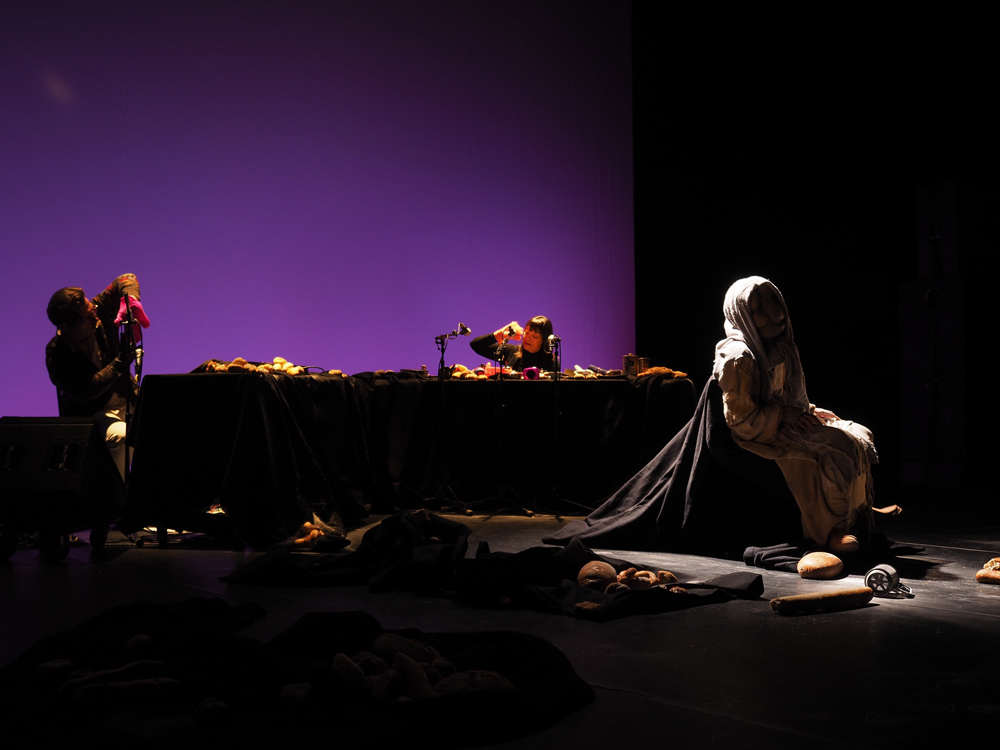Mother Tongue
Anna Homler and Steven Warwick’s Breadwoman highlights the ever-iterative performance of the female voice
Anna Homler and Steven Warwick’s Breadwoman highlights the ever-iterative performance of the female voice

Natsuko Kono sits centre stage wearing a mask fashioned from a hollowed-out loaf of bread and a tattered cotton and cheesecloth robe. Surrounded by an assemblage of blankets, more loaves of bread and a flour shaker, she looks old and haggard. Yet her movements, while slow and considered, are graceful. She’s playing the eponymous, mythical character in the Berlin premiere of Anna Homler and Steven Warwick’s production Breadwoman.
‘Breadwoman’ is a character developed by US artist Homler in the early 1980s. Her appearance here, as part of CTM music and visual arts festival in February, is the same day as the reissue, by the New York label RVNG Intl, of Homler and musician Steve Moshier’s original scoring of the work. The album, Breadwoman and Other Tales (1982/2016), features seven tracks of Homler’s shamanic vocals atop Moshier’s ritualistic percussion and ambient production, originally recorded and staged in Los Angeles performance art scene during the 1980s.

In Berlin, Warwick and Homler sit behind Kono at a desk that spans the stage, backlit by a deep purple screen. Amidst Warwick’s musical gadgets sit everyday objects – from kitchen utensils to children’s toys to a novelty singing birthday card. Each reveals unexpected sonic potential when handled by the two artists. Both electronic musician (going by the name Heatsick) and visual artist, Warwick is attune to the demands of a performance lying somewhere between DJ-set, theatre-piece, interpretive dance recital and installation.

Periodically Homler leans into the microphone to deliver an unbridled string of melodic ‘bread language’. This language, which she calls a ‘universal tongue’, draws impressionistically from the sonic qualities of an extensive swathe of (real) languages – from Swahili to Ancient Hebrew – devoid of semantic value but carrying the sound and syntactical structure of formalized communication.
The produced sounds are expansive, colouring the atmosphere; they grow increasingly apparitional as Breadwoman’s actions become pantomimic. She shakes the flour shaker above her head and, illuminated by powerful stage lights from each side, she is subsumed in a powdery white cloud. She lobs the broken tip of a baguette into the audience and sets herself as if batting in a baseball game, waiting for the pitch. When an audience member throws her the ‘ball’, she remains motionless for a few seconds, only to swing at a glacial pace, many seconds later. They aren’t playing the same game.

Breadwoman is something of a performative framework, anchored to the ‘timeless’ figure of the loaf-masked woman and the ‘mother tongue’ she speaks. According to Warwick, Homler isn’t interested in recreating a past performance, but rather in Breadwoman’s contemporary manifestations: a different dancer has played the role in each of the production’s host cities (Homler and Warwick toured the production throughout the UK after Berlin). Each dancer has employed a different dance tradition (Kono is a Butoh dancer), each has reacted differently to the minimal stage directions and musical cues. The sound, too, is no more fixed than the choreography – engineered, for the most part, in real time, with (updated) equipment from Moshier’s original work. Homler has identified Breadwoman with mythical figures such as Demeter, the Greek goddess of harvest, and Isis, the Egyptian goddess of grain, and the meandering development that comes with each installment mirrors the distortionary effect of oral traditions – of myth and storytelling. Yet, this Breadwoman bears the inexpressible trace of her former invokers, concealed but somehow always already present.






















